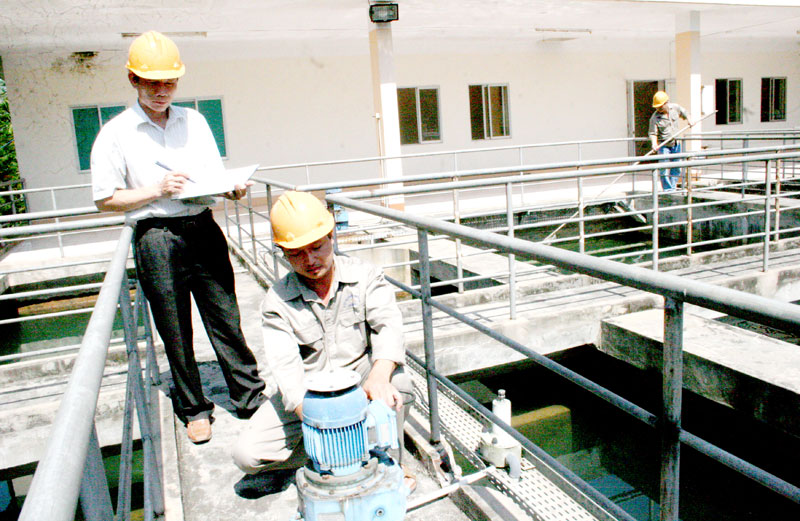
(HBO) – Hoa Binh Clean Water joint Stock Company is conducting State capital divestment. Most of the share offering sessions have attracted particular interest from investors. So far, the company has divested 60 percent of the State shares and the process is expected to be completed in 2018.
Workers of the Hoa Binh Clean Water joint Stock Company are
operating a pumping station in the left bank of Da River in Hoa Binh city.
In March 2009, the provincial People’s Committee issued Decision No.539/QD-UBND
approving the transfer of Hoa Binh Clean Water one member limited liability
company to Hoa Binh Clean Water joint Stock Company.
After conducting equitisation, the company had sold its shares at preferential
prices to employees. Each share is worth 10,000 VND. However, the number of
officials and workers holding shares was inconsiderable (less than one
percent).
The company is operating under the business registration certificate No.
5400108279 and has raised its chartered capital for the third time to over 66.7
billion VND from 61.1 billion VND after the assets of water plants in Lac Thuy
and other districts were merged into the company’s State capital.
It is mainly active in the field of clean water supply, treatment and
exploitation. Key services include providing clean water for households and
production businesses in Hoa Binh province.
Since 2005, the company has provided water bottles of 0.5 liters and 19 litres.
It also installed and repaired water supply facilities to meet the demand of
locals.
Its revenues in 2017 reached over 55.19 billion VND (2.3 million USD),
including 48.88 billion VND (2.08 million USD) from clean water or 88.56
percent of the total, and 5.33 billion VND (227,812 USD) from installing and
repairing water pipes or 9.67 percent.
According to Chairwoman of the Board of Hoa Binh Clean Water joint Stock
Company Nguyen Thi Hoa said the company put nearly 6.8 million shares worth
66.8 billion VND (2.8 million USD) for sale on the Unlisted Public Company
Market (UPCoM) on July 18, 2018./.
With the motto "product quality comes first," the Ban Muong Clean Food Agricultural Cooperative in Hung Son commune, Kim Boi district, has gained consumers’ trust after nearly a year of operation. Their products, including Ban Muong Vietnamese pork sausage and ready-to-eat salt-cured chicken and pig's trotters, are gradually establishing a solid market presence, with efforts underway to complete their One Commune-One Product (OCOP) certification process.
As large investors and projects play a crucial role in optimising local potential and advantages, Hoa Binh province has established a steering committee to promote major projects and foster progress. With strengths in agriculture, industry, and tourism, the province is positioning itself as an emerging investment destination in northern Vietnam.
The recent groundbreaking of a luxury eco-urban complex and cable car system in Cuoi Ha and Kim Boi communes of Kim Boi district, invested by Hoa Binh Sun Co. Ltd., is a demonstration of Hoa Binh province’s steadfast commitment to improving its investment environment. This flagship project exemplifies the province's ambition to become a leading destination for major domestic and international investors.
May 2025 marked a pivotal moment in Vietnam’s national development journey as the Politburo issued Resolution 68 on the development of the private economy. More than just a policy directive, this resolution represents a revolution in economic thinking and institutional reform, paving a promising "avenue” for the private sector’s growth.
Once seen as an industrial "zero" at the time of its re-establishment in 1991 and the following years, Hoa Binh province has undergone a remarkable transformation, emerging as a dynamic industrial hub in Vietnam's Northwest gateway region.
In Lac Thuy district, communes have been succeeded in promoting their One Commune-One Product (OCOP) products while others are still struggling to position their typical farming products in market. Some communes in the district still fail to have their products met OCOP programme’s requirements, while others have seen their certifications expired.



